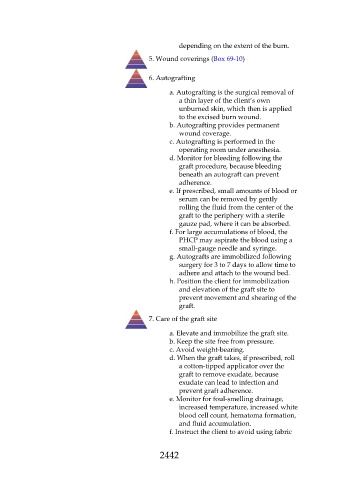Page 2442 - Saunders Comprehensive Review For NCLEX-RN
P. 2442
depending on the extent of the burn.
5. Wound coverings (Box 69-10)
6. Autografting
a. Autografting is the surgical removal of
a thin layer of the client’s own
unburned skin, which then is applied
to the excised burn wound.
b. Autografting provides permanent
wound coverage.
c. Autografting is performed in the
operating room under anesthesia.
d. Monitor for bleeding following the
graft procedure, because bleeding
beneath an autograft can prevent
adherence.
e. If prescribed, small amounts of blood or
serum can be removed by gently
rolling the fluid from the center of the
graft to the periphery with a sterile
gauze pad, where it can be absorbed.
f. For large accumulations of blood, the
PHCP may aspirate the blood using a
small-gauge needle and syringe.
g. Autografts are immobilized following
surgery for 3 to 7 days to allow time to
adhere and attach to the wound bed.
h. Position the client for immobilization
and elevation of the graft site to
prevent movement and shearing of the
graft.
7. Care of the graft site
a. Elevate and immobilize the graft site.
b. Keep the site free from pressure.
c. Avoid weight-bearing.
d. When the graft takes, if prescribed, roll
a cotton-tipped applicator over the
graft to remove exudate, because
exudate can lead to infection and
prevent graft adherence.
e. Monitor for foul-smelling drainage,
increased temperature, increased white
blood cell count, hematoma formation,
and fluid accumulation.
f. Instruct the client to avoid using fabric
2442

